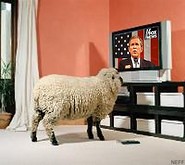Next Mission: Iran
Since our last mission was so accomplished, it is now official: Our next target is Iran. We have not finished what was started in Iraq and we are already looking for another battle to fight. What I wonder is that which part of the Iraq conflict has lead the Bush Administration to conclude that the strategy espoused in Iraq--that is to invade, cause a regime change, install a puppet regime and occupy the country in US basis indefinitely--is something that is a good recipe for the rest of the region?
Is it the fact that we are losing the battle to the insurgents? Is it the fact that the Iraqis now mostly see us as occupiers with designs on their oil supply? Is it because that Al Quaeda has now been able to expand to 60 countries instead of the 45 in2001? Is it because our actions in Iraq has been heaven sent from Osama Bin Laden's point of view? Which part really is helping shape this policy of war? Or is it that in what must be a perpetual war on terror the Bush Administration and its Neocon's members the Terror and its perpetual effect on people right here is the result sought. While hundreds of American soldiers have died and thousands have been maimed, mutilated and gone berserk, the Halliburtons and others are in fact making their millions and are living happily in the midst of the chaos.
So we read on and while no one expected the Iraq invasion, the words of my grandpa comes to my mind when talking about the Brits but it is still highly appropriate regarding the current Administration: "from these bastards, anything is possible."
The New Yorker: Fact
Despite the deteriorating security situation in Iraq, the Bush Administration has not reconsidered its basic long-range policy goal in the Middle East: the establishment of democracy throughout the region. Bush’s reëlection is regarded within the Administration as evidence of America’s support for his decision to go to war. It has reaffirmed the position of the neoconservatives in the Pentagon’s civilian leadership who advocated the invasion, including Paul Wolfowitz, the Deputy Secretary of Defense, and Douglas Feith, the Under-secretary for Policy. According to a former high-level intelligence official, Secretary of Defense Donald Rumsfeld met with the Joint Chiefs of Staff shortly after the election and told them, in essence, that the naysayers had been heard and the American people did not accept their message. Rumsfeld added that America was committed to staying in Iraq and that there would be no second-guessing.
Is it the fact that we are losing the battle to the insurgents? Is it the fact that the Iraqis now mostly see us as occupiers with designs on their oil supply? Is it because that Al Quaeda has now been able to expand to 60 countries instead of the 45 in2001? Is it because our actions in Iraq has been heaven sent from Osama Bin Laden's point of view? Which part really is helping shape this policy of war? Or is it that in what must be a perpetual war on terror the Bush Administration and its Neocon's members the Terror and its perpetual effect on people right here is the result sought. While hundreds of American soldiers have died and thousands have been maimed, mutilated and gone berserk, the Halliburtons and others are in fact making their millions and are living happily in the midst of the chaos.
So we read on and while no one expected the Iraq invasion, the words of my grandpa comes to my mind when talking about the Brits but it is still highly appropriate regarding the current Administration: "from these bastards, anything is possible."
The New Yorker: Fact
Despite the deteriorating security situation in Iraq, the Bush Administration has not reconsidered its basic long-range policy goal in the Middle East: the establishment of democracy throughout the region. Bush’s reëlection is regarded within the Administration as evidence of America’s support for his decision to go to war. It has reaffirmed the position of the neoconservatives in the Pentagon’s civilian leadership who advocated the invasion, including Paul Wolfowitz, the Deputy Secretary of Defense, and Douglas Feith, the Under-secretary for Policy. According to a former high-level intelligence official, Secretary of Defense Donald Rumsfeld met with the Joint Chiefs of Staff shortly after the election and told them, in essence, that the naysayers had been heard and the American people did not accept their message. Rumsfeld added that America was committed to staying in Iraq and that there would be no second-guessing.










0 Comments:
Post a Comment
<< Home